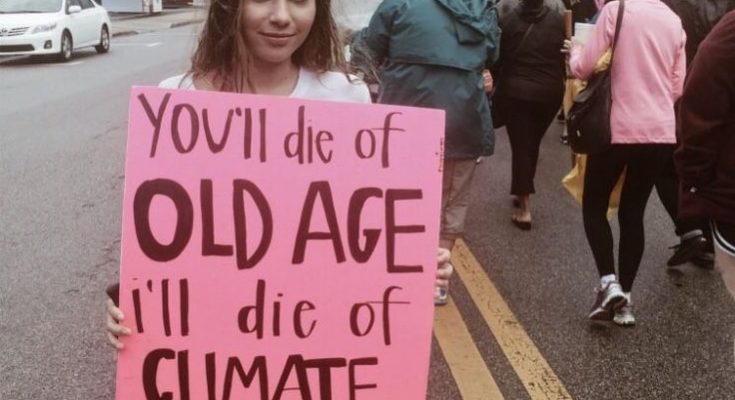The phrase “You will die of old age, I’ll die of climate change!” highlights the generational divide in the impact of climate change. Young people today face the brunt of the environmental crisis, unlike older generations who may not experience its most severe consequences. This slogan underscores the urgency felt by younger generations, as they confront rising temperatures, extreme weather events, biodiversity loss, and ecosystem collapse.
The science behind climate change is well established: human activities, especially the burning of fossil fuels and deforestation, have led to unprecedented levels of greenhouse gases in the atmosphere, resulting in global warming. The consequences are dire. From intensifying hurricanes to prolonged droughts, melting ice caps, and rising sea levels, the planet is experiencing significant changes that are altering ecosystems and human livelihoods alike.
### Generational Differences in Climate Responsibility
The phrase also calls out the generational gap in responsibility for the climate crisis. Older generations, especially those in industrialized nations, contributed more to carbon emissions through decades of industrial activities and consumption patterns. Younger generations, who inherit the planet under deteriorating conditions, feel a deep sense of injustice. They must live with the consequences of decisions made long before they had the opportunity to influence policies or societal behaviors.
Many climate activists argue that while older generations benefited from the economic growth fueled by fossil energy, younger generations are left to clean up the environmental mess. This intergenerational tension is a key factor in the increasing activism and climate strikes led by youth movements worldwide.
### The Inescapable Reality of Climate Change
The phrase “I’ll die of climate change” is a powerful way to convey the severity of the situation. Climate change is no longer a distant future concern; it’s a pressing reality affecting millions of people today. In some parts of the world, entire communities face displacement due to rising sea levels, prolonged droughts, or increasingly powerful storms. Many small island nations, such as the Maldives, are at risk of being submerged within decades, and vulnerable populations in low-lying coastal areas may soon become climate refugees.
For young people, the threat feels more personal. They witness firsthand the acceleration of climate impacts, and projections for the future paint a grim picture if immediate and drastic action isn’t taken. These individuals may live through a period when climate change could drastically alter human civilization, potentially leading to widespread food insecurity, mass migrations, and conflict over dwindling resources.
### The Science Behind the Fear
Scientific consensus supports the urgency behind the climate crisis. The Intergovernmental Panel on Climate Change (IPCC) has repeatedly warned that limiting global warming to 1.5°C above pre-industrial levels is crucial to avoiding catastrophic impacts. Beyond this threshold, the world faces a much greater risk of tipping points, where feedback loops could accelerate climate change beyond human control. For instance, the melting of Arctic ice reduces the planet’s ability to reflect sunlight, which then accelerates warming in a vicious cycle.
Yet, despite the overwhelming evidence, global efforts to reduce emissions have been slow. Current policies and pledges put the world on track for 2.5°C to 3°C of warming by the end of the century, a scenario that would result in severe and widespread impacts, particularly for the most vulnerable.
### Youth Activism: A Response to Inaction
In response to this looming crisis, youth movements have taken center stage in demanding climate action. **Greta Thunberg**, the Swedish climate activist, is a prominent figure who has inspired millions of young people to participate in climate strikes. Her movement, **Fridays for Future**, emphasizes that future generations shouldn’t have to bear the consequences of inaction today. In her speeches, she has pointed out the moral failure of older generations, whose lack of urgency threatens the future of the planet.
Beyond marches and strikes, young people are also influencing climate litigation. In several countries, youth plaintiffs have sued their governments, claiming that insufficient climate policies violate their right to a livable future. These legal cases highlight the profound implications of climate inaction: young people argue that failing to address the crisis constitutes a form of intergenerational injustice.
### Climate Change and Mental Health
For many young people, climate change isn’t just an environmental issue but a profound emotional burden. The term **eco-anxiety** has been coined to describe the feelings of hopelessness, fear, and anger that arise from the awareness of climate change’s potential consequences. Knowing that the Earth is changing in irreversible ways can be mentally overwhelming, especially for those who feel powerless to enact change.
Studies have shown that many young people are deeply concerned about the future, with some expressing reluctance to have children in a world facing climate collapse. The psychological toll of climate change is real, and for some, the fear of “dying from climate change” isn’t metaphorical. It reflects the weight of living in a world where the stability of natural systems is no longer guaranteed.
### Economic and Environmental Injustice
Climate change also intersects with issues of **inequality**. Historically, those least responsible for greenhouse gas emissions — often in the Global South — are the most vulnerable to its effects. Regions that contribute little to climate change, such as sub-Saharan Africa and Southeast Asia, are already facing devastating droughts, floods, and food shortages. Meanwhile, wealthier nations, whose industries have contributed the most to the crisis, are better equipped to adapt and mitigate its effects, further exacerbating global inequalities.
This imbalance also affects younger generations, who will have to bear the financial and social costs of climate adaptation and mitigation. Transitioning to renewable energy, investing in sustainable infrastructure, and restoring damaged ecosystems require massive investments, and future generations will be responsible for these efforts. The longer significant action is delayed, the more difficult and expensive it will be to implement solutions.
### The Importance of Immediate Action
If climate change is to be addressed effectively, transformative action must be taken now. This includes dramatically reducing carbon emissions, transitioning away from fossil fuels, and investing in technologies that can help mitigate the effects of climate change. However, these actions require political will, economic investments, and social cooperation on an unprecedented scale.
The longer we delay action, the harder it will be to prevent the most catastrophic outcomes. Each fraction of a degree in warming represents increased risks for ecosystems, human health, and the stability of global systems. For young people, the sense of urgency is not abstract; it is tied directly to their future.
### Hope for the Future?
Despite the grim outlook, there are reasons for hope. Technological advances in renewable energy, energy storage, and carbon capture offer promising solutions. Social movements are gaining traction, pushing for policy changes and corporate accountability. Youth activism is drawing attention to the crisis, and some governments are beginning to take climate change seriously, incorporating it into their policy agendas.
Nevertheless, the path forward is uncertain. Without sustained global cooperation, massive investments in clean energy, and a rethinking of economic systems that prioritize short-term profits over long-term sustainability, the climate crisis will continue to worsen. For the younger generation, their rallying cry serves as both a warning and a demand: the time to act is now.
### Conclusion
“You will die of old age, I’ll die of climate change” captures the stark reality faced by today’s youth. They are witnessing the early signs of a planetary crisis that threatens not just ecosystems but the very foundations of human civilization. The phrase reflects the frustration, fear, and urgency felt by younger generations, who must navigate a world increasingly shaped by environmental disasters and political inaction.
Changing this trajectory requires immediate, far-reaching action. While older generations may not experience the full consequences of climate change, it’s the responsibility of all generations to confront the crisis head-on. Only by working together — across generational, political, and national boundaries — can we hope to create a future where young people no longer fear dying of climate change but instead live in a world that thrives in harmony with nature.



